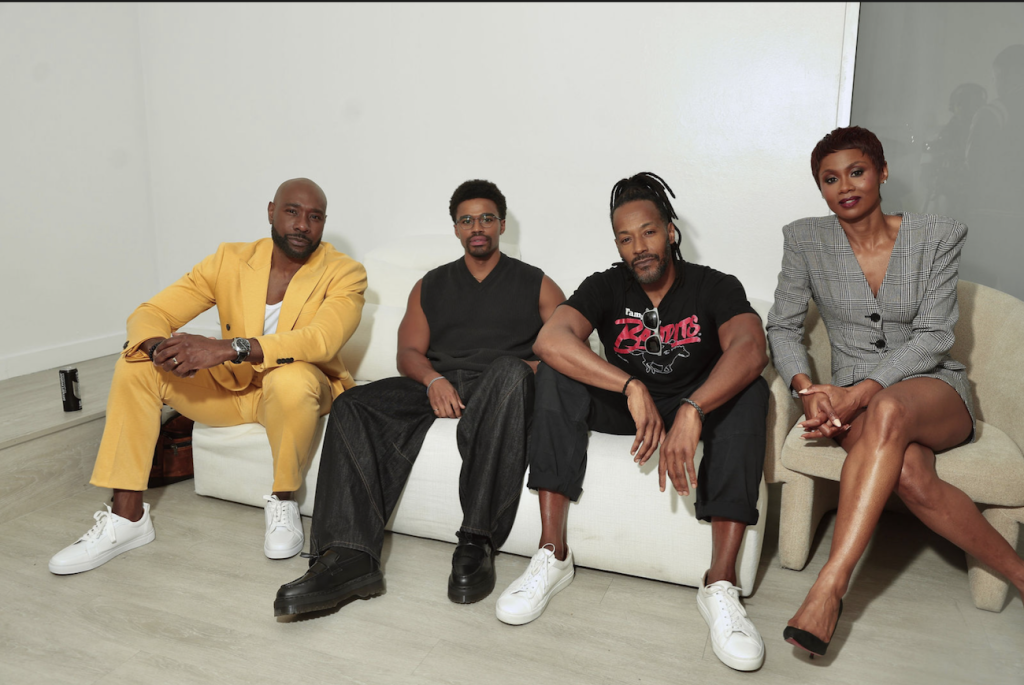Four episodes into Season 3, Reasonable Doubt continues to grip audiences with its storytelling, complex characters, and unapologetic Black perspective.
Fans are waiting for Thursdays like clockwork, ready to dive back into a legal drama that’s as much about justice as it is about identity, truth, and power.
At this year’s CultureCon, the cast—Emayatzy Corinealdi, McKinley Freeman, and Kyle Bary—joined surprise moderator Morris Chestnut for the panel Reasonable Doubt: Performance, Perspective, & Power in Storytelling.
Before taking the stage, the group sat down with The Quintessential Gentleman Editor-in-Chief Eric Keith to talk about what keeps audiences hooked and how the show embodies this year’s CultureCon theme: “We made space. Now we’re claiming it.”
When asked why Reasonable Doubt has become such a cultural favorite, the cast agreed—the show feels real.
“First and foremost, it’s real,” Chestnut said. “We’re dealing with real-life situations and circumstances, and the show is beautifully written and beautifully performed.”
Bary echoed that sentiment, emphasizing the series’ connection to the full spectrum of Black life. “It touches on all the areas of Black culture, the good, the bad, the ugly. You’ll be turned on, you’ll be turned off, you’ll be angry, all the things. That’s what Reasonable Doubt is.”
Freeman broke it down even further, describing the show’s richness beyond its dialogue and plotlines. “It’s textured…it’s the music, it’s the clothes, it’s the vocabulary, it’s the nuance. Those things make up the fabric of what makes Reasonable Doubt special.”
Corinealdi, who anchors the series as Jax Stewart, credited creator Raamla Mohammed for ensuring that every layer of the show feels intentional.
“She does not play; this is her baby, and she’s committed to every single element,” she said. “Those are the dynamics that everyone loves.”
But beyond the dialogue, the aesthetics, and the tension-filled courtroom scenes, Reasonable Doubt represents something deeper, a reclaiming of narrative and presence for Black creatives and audiences.
When asked what it means to “claim space,” Corinealdi spoke to the power of authenticity.
“Being your authentic self, whatever that is,” she said. “Not shortchanging yourself, not trying to dumb anything down. When you walk in that, that’s the power. You don’t even have to say anything.”
Freeman added that claiming space also means embracing one’s full potential in the present moment. “Part of it is definitely allowing yourself to be the fullest version of yourself in this example of time,” he said. “All we have is time. So stand in it and stand confidently.”
Bary put it simply—with a nod to James Brown. “He said it best, and he said it loud: Black and proud,” he said. “That’s what this feels like, all these beautiful Black people in their fits, walking around with their heads held high, ready to talk about the art that influences the culture.”
Chestnut reflected on the significance of that message in today’s climate. “We’re going through a time of so much uncertainty and so much change,” he said. “So just claim your space. Be you. Be authentically you. Be Black and be proud. Don’t live for other people. Don’t try to put on images for other people. It’s substance over style.”
In many ways, that’s the essence of Reasonable Doubt, a show that mirrors the messiness, beauty, and brilliance of real life, while inviting its audience to show up fully, too.
Photo Credit: Lawrence Pitts
Videography: Xavier Vozo




